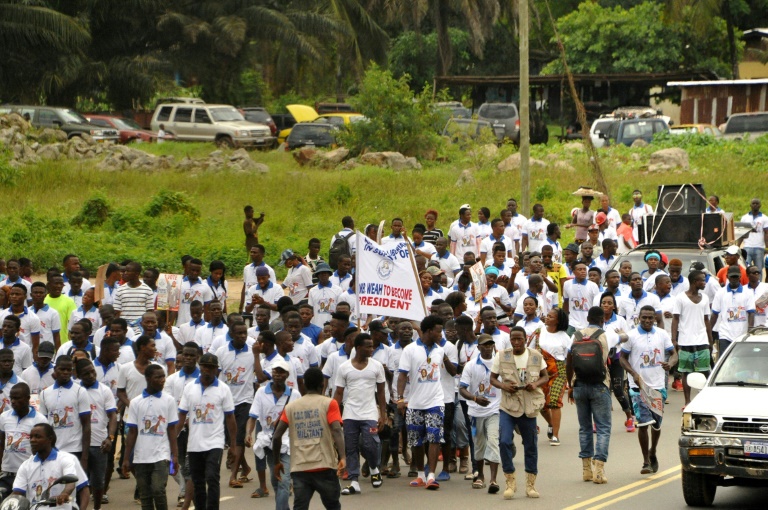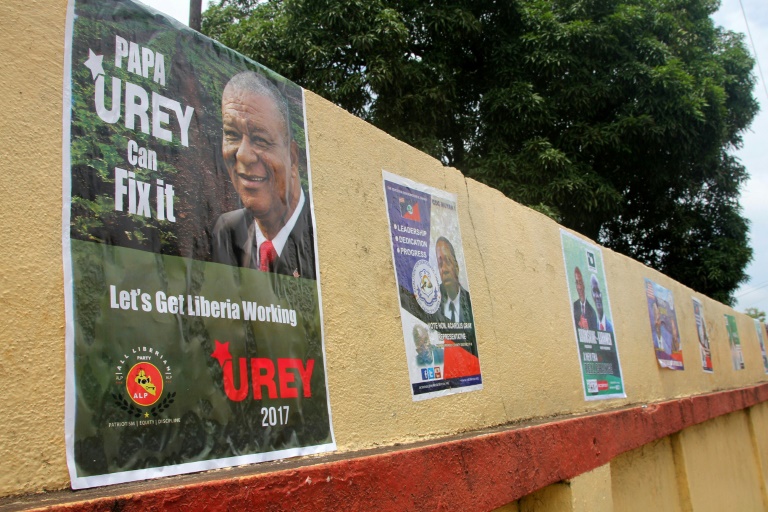Bulls say Kurt-Lee isn’t going anywhere
Ellen Johnson Sirleaf is stepping down and there is no obvious frontrunner to lead the fragile west African state.
The Nobel Prize-winning Sirleaf was elected to run in 2005 following a long civil war which left deep scars on Liberia’s economy and social fabric.
Elections for the presidency and House of Representatives take place on October 10 — the first time since the end of the conflict in 2003 that the country will hold a vote without UN peacekeepers providing security.
Ahead of candidates opening their campaigns, the UN appealed for the ballot to go ahead smoothly, urging all “to spare no effort in their pursuit of peaceful elections.”

Supporters of former footballer George Weah march on July 31, 2017 in Monrovia
Among the final president/vice-president tickets published by the National Elections Commission (NEC) on Monday, key figures from the civil conflict loom large.
Senator Prince Johnson — a onetime rebel fighter filmed drinking beer during the notorious murder of former president Samuel Doe in 1990 — is standing for president for the Movement for Democracy and Reconstruction (MDR).
Football superstar and Senator Weah will stand for the Coalition for Democratic Change (CDC) with Jewel Howard-Taylor, 54, the ex-wife of Charles Taylor, as his vice-president pick.
Weah told AFP he was “fully ready to take the presidency this time,” following a failed bid for the job in 2005.
Charles Taylor, once Liberia’s most feared rebel fighter, is serving a 50-year sentence in a British jail for his role in fuelling neighbouring Sierra Leone’s own long civil conflict.
Two prominent businessmen, Coca-Cola executive Alexander Cummings and telecoms tycoon Benoni Urey, are standing on pro-jobs and pro-growth platforms as they aim to bring corporate expertise to the presidency.
“Getting Liberians working is priority number one,” Urey said in a statement on Monday.
– Fears of violence –
The only female presidential candidate, MacDella Cooper, a fashion model turned philanthropist who is promising “hope and reform” for the poor, largely rural nation.

A campaign poster bearing a portrait of Benoni Urey (L), prominent businessman and presidential candidate for the All Liberian Party as the campaign kicks off
Sirleaf’s vice president, Joseph Boakai, is hoping the record of keeping the peace will be enough to propel him to the top job, despite complaints that the ruling Unity Party has failed to deliver on the economy.
The international community is preoccupied with electoral violence, however, as the underfunded Liberian security forces take over security.
“These elections, and the subsequent transition, will mark a significant milestone whereby a sitting president will hand over power from one elected president to another,” the United Nations Mission in Liberia (UNMIL), African Union, and regional body ECOWAS said in a statement.
“We remind political parties of their obligations to peaceful campaigning in compliance with the country’s electoral laws and international standards,” it added.
Liberia’s Inspector General of Police Gregory Coleman assured Monday that the once highly politicised force would “avoid the mistakes that we made in times past,” deploying officers to protect presidential candidates.
“These officers are not there to spy on you,” Coleman said.
Download our app